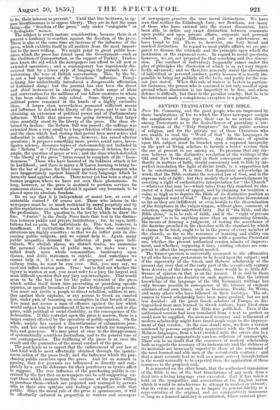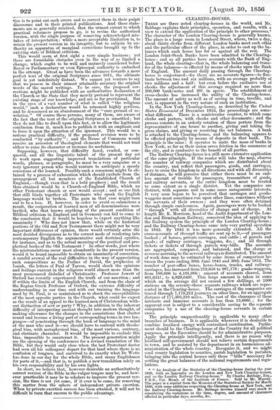REVISED TRANSLATION OF THE BIBLE.
Pace Dr. Cumming, and the good people who are impressed by those lucubrations of his to which the Times newspaper assigns the compliment of large type, there can be no serious dispute among Protestants as to the desirableness of providing a cor- rect version of the "Holy Scriptures" for the public services of religion, and for the private use of those Christians who are unable to read the "'Word of God" in the languages in which it was originally written. Any difference of opinion upon this subject must be founded upon a supposed incapacity on the part of living scholars to furnish a better version than the one at present in use among us. To presume that any sin- cere believer in the distinctive revelation of the writings of the Old and New Testament, and in their consequent supreme au- thority in matters of faith, should consciously seek to hide by im- perfect translation the light of divine truth, is a supposition not to be entertained. It is true that Romanists acknowledge in words that the Bible contains the revealed law of God, and is the supreme rule of faith ; but they modify their acknowledgment by asserting a right of authoritative interpretation for "the Church" —whatever that may be—which takes from this standard its cha- racter of a final court of appeal, and by claiming for tradition a value so high as to deprive the Bible of its distinctive position as "the inspired word of God." They are not therefore inconsistent so far as they are indifferent or even hostile to the dissemination. of the Scriptures in the vulgar tongue, without gloss, comment, or selection, among the unlettered laity. But if "the Bible, and the Bible alone," is to be rule of faith, and if the "right of private judgment" is to be anything more than an unmeaning formula, the means of forming a judgment, of testing the accordance of the doctrine preached in the churches with the standard by which it claims to be tried, ought to be in the power of every member of the church, so far as the resources of learning and ability can supply it. The only possible questions with a genuine Protestant are, whether the present authorized version admits of improve- ment, and whether, supposing it does, existing scholars are com- petent to effeet the improvement needed.
The former question is universally answered in the affirmative by all who have any pretensions to be heard upon the subject ; and if the superiority of the Greek and Hebrew scholarship of the present day over that of the early part of the seventeenth cen were decisive of the latter question, there would be as little ference of opinion on that as on the former. It is said by those whose judgments are decisive on such matters, that the critical knowledge of the language of the Old Testament writings has only become possible in consequence of the labours of eminent scholars of our own times, such as Gesenius, Ewald, Be Wette, and many others who have followed in their footsteps. The ad- vances in Greek scholarship have been more gradual, but are not less decided : all the great Greek scholars of Europe, as dis- tinguished from men learned in Greek authors have lived since the authorized version of the Bible was published. Even if the authorized version had been translated from a text as perfect as could now be supplied, the increased accuracy and refinement of modern scholarship might have found ample scope in the improve- ment of that version. As the case stands now, we have a version rendered by persons imperfectly acquainted with the Greek and Hebrew languages, from a text crowded with the errors due to a very partial and comparatively careless collation of manuscripts. There can be no doubt that the resources of modern scholarship both as regards the accuracy of its instruments and the richness of its materials are immensely superior to those at the command of the most learned and able men of the seventeenth century ; and that a more accurate text as well as a more correct interpretation is the result naturally to be expected from the application of these resources to the proposed task. It is asserted on the other hand, that the authorized translation of the Bible is one of the best translations of any work from a dead into a living language ever executed ; that it has taken a hold on the sympathies and associations of the English nation
which it would be mischievous to attempt to weaken or subvert ; that its errors are not such as to impair its general fidelity as a
representative of the original, and are comparatively innocuous so long as a learned ministry is maintained, whose constant prac- -tice is to point out such errors and to correct them in their pulpit discourses and in their printed publications. And these state- ments are so generally received, that the utmost extent to which practical reformers propose to go, is to revise the authorized version with the single purpose of removing acknowledged mis-
takes of interpretation ; while a more acceptable limitation is, to retain the present version in its integrity, but to subjoin by au- thority an apparatus of marginal corrections brought up to the existing state of Biblical criticism. This would seem at first sight a very- simple business ; yet there are formidable obstacles even in the way of so limited a
change, which ought to be well and maturely considered before Royal or Parliamentary or even Episcopal authority is embarked in the attempt. Great as have been the advances towards a more perfect text of the original Scriptures since 1611, the ultimate
goal is yet indefinitely- distant. We cannot yet venture to say
that we possess in their utmost attainable aocuracy the original words of the sacred writings. To be sure, the proposed cor-
rections might be published with an authoritative declaration of the Church or the State that they merely pretend to represent the existing stage of our knowledge, and are so far provisional. But in the eyes of a vast number of what is called "the religious world," such a declaration would be esteemed highly perilous,
and be denounced as an abandonment of the "sure ground of re- velation." Of course these persons, many of them are aware of
the fact that the text of the original Scriptures is Unsettled ; but they do not like to dwell upon this fact, or to allow the legitimate conclusion from it, much less to publish it -with an emphasis and to force it upon the attention of the ignorant. This would be a serious practical difficulty, if the proposed revision were to be conducted "by authority"; ; and the House of Commons would receive an accession of theological elements that would not tend either to raise its character or increase its usefulness.
Supposing, however, that difficulty faced, evaded, or con- quered and all the linguistic talent of the present day set to work upon suggesting improved translations of particular words, phrases, or paragraphs, he must be a very sanguine or a very ignorant person who would venture to anticipate a speedy consensus of the learned. Possibly such a consensus might be ob- tained by a process of exhaustion which should exclude from the arrangement all but members of the Established Church of England,—though even that is a bold prophecy ; and the result thus obtained would be a Church-of-England Bible, which no other Protestant church or sect would accept ; and so one link that still binds together all Protestants who speak the English language would be broken. The gain in that case might turn out to be a loss. If, however, in order to avoid so calamitous a result, the cooperation of learned men of all denominations were 'invited, who that knows anything of the present condition of Biblical criticism in England and in Germany can fail to come to the conclusion that it would be hopeless to expect anything like unanimity ? Who does not know that, while on the historical portions of the Old and New Testmament there might not be very important differences of opinion, there would certainly arise the most decided divergences as to the correct mode of rendering into contemporary English the argumentative and doctrinal epistles, for instance, and as to the actual meaning of the poetical and pro- phetical books of the Old Testament ? In other words, just where the mistranslations occur most abundantly in the present version, would it be found impossible to obtain an unanimity of correction. A candid avowal of the real difficulties in the way of appreciating such compositions as the Psalms of David, the prophecies of Isaiah, the letters of Paul of Tarsus, would shock the opinions and feelings current in the religious world almost more than the most pronounced disbelief of Christianity. Professor Jowett of Oxford has recently experienced the truth of our assertion ; and if within the limits of the English Church, and from the chair of the Regius Greek Professor of Oxford, the extreme difficulty of understanding in our time and with our training the lanpage used by St. Paul, is so maintained as to shock the susceptibilities of the most opposite parties in the Church, what could we expect as the result of an appeal to the learned men of Christendom with- out distinction of sect or party ? Why, in addition to the inherent difficulty of interpreting ancient thought into modem thought, of making allowance for the changes in the associations that cluster round and become a living part of corresponding terms in two lan- guages—of penetrating through the husk of language to the mind of the man who used it—we should have to contend with theolo- gical bias with metaphysical bias, of the most various, contrary, and obstinate character. It would be impossible to exclude this bias, impossible to counteract it. The present generation might
• see the opening of the conferences for a revised translation of the Bible, but they would only close when the last Protestant doctor had seen all his colleagues depart for that land where there is no confusion of tongues, and survived to do exactly what De Wette has done in our clay for the whole Bible, and many Englishmen for parts of it,—and that is, to publish a new translation solely on his own responsibility and by his own lights. In short, we believe that, however desirable an authoritatively correct version of the Bible in the vulgar tongue may be, and how- ever practicable it may be to scholars to improve the present ver- sion, the time is not yet come, if it ever is to come, for removing tins matter from the sphere of independent private exertion. When by private exertion success has been attained, it will not be difficult to turn that success to the public advantage.



























 Previous page
Previous page